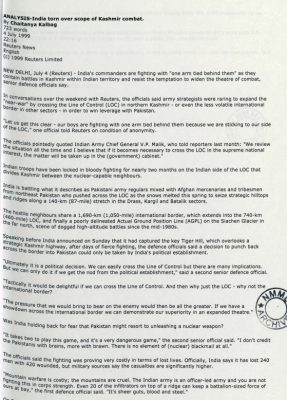ANALYSIS-India torn over scope of Kashmir combat
[Reuters]
Published date: 4th Jul 1999
4 July 1999
Reuters News
English
(c) 1999 Reuters Limited
NEW DELHI, July 4 (Reuters) – India’s commanders are fighting with “one arm tied behind them” as they contain battles in Kashmir within Indian territory and resist the temptation to widen the theatre of combat, senior defence officials say.
In conversations over the weekend with Reuters, the officials said army strategists were raring to expand the near-war” by crossing the Line of Control (LOC) in northern Kashmir – or even the less volatile international border in other sectors – in order to win leverage with Pakistan.
Let us get this clear – our boys are fighting with one arm tied behind them because we are sticking to our side of the LOC,” one official told Reuters on condition of anonymity.
The officials pointedly quoted Indian Army Chief General V.P. Malik, who told reporters last month: “We review the situation all the time and I believe that if it becomes necessary to cross the LOC in the supreme national interest, the matter will be taken up in the (government) cabinet.”
Indian troops have been locked in bloody fighting for nearly two months on the Indian side of the LOC that divides Kashmir between the nuclear-capable neighbours.
India is battling what it describes as Pakistani army regulars mixed with Afghan mercenaries and tribesmen from northeast Pakistan who pushed across the LOC as the snows melted this spring to seize strategic hilltops and ridges along a 140-km (87-mile) stretch in the Drass, Kargil and Batalik sectors.
The hostile neighbours share a 1,690-km (1,050-mile) international border, which extends into the 740-km (460-mile) LOC, and finally a poorly delineated Actual Ground Position Line (AGPL) on the Siachen Glacier in the far north, scene of dogged high-altitude battles since the mid-1980s.
Speaking before India announced on Sunday that it had captured the key Tiger Hill, which overlooks a strategic Kashmir highway, after days of fierce fighting, the defence officials said a decision to punch back across the border into Pakistan could only be taken by India’s political establishment.
“Ultimately it is a political decision. We can easily cross the Line of Control but there are many implications.
But we can only do it if we get the nod from the political establishment,” said a second senior defence official.
Tactically it would be delightful if we can cross the Line of Control. And then why just the LOC – why not the International border?
The pressure that we would bring to bear on the enemy would then be all the greater. If we have a showdown across the international border we can demonstrate our superiority in an expanded theatre.”
Was India holding back for fear that Pakistan might resort to unleashing a nuclear weapon?
“It takes two to play this game, and it’s a very dangerous game,” the second senior official said. “I don’t credit the Pakistanis with brains, more with brawn. There is no element of (nuclear) blackmail at all.”
The officials said the fighting was proving very costly in terms of lost lives. Officially, India says it has lost 240 men with 420 wounded, but military sources say the casualties are significantly higher.
Mountain warfare is costly; the mountains are cruel. The Indian army is an officer-led army and you are not lighting this in corps strength. Even 20 of the infiltrators on top of a ridge can keep a battalion-sized force of ours at bay,” the first defence official said. “It’s sheer guts, blood and steel.”
on Friday Indian military spokesmen vowed to fight through the severe Kashmir winter if necessary to evict the infiltrators.
It would be very easy to open new fronts (to add pressure on Pakistan),” the second defence official said. We could have hit back (across the LOC) and taken the guerrillas” supply lines. We don’t necessarily agree with the government’s approach, but it’s policy.”
Asked if Indian military commanders were optimistic Pakistan Prime Minister Nawaz Sharif’s talks with U.S. President Bill Clinton in Washington on Sunday might yield a peace plan, the official said:
I don’t see anything emerging. It gives you a good feeling in the morning when you read the newspapers, but then what?”






